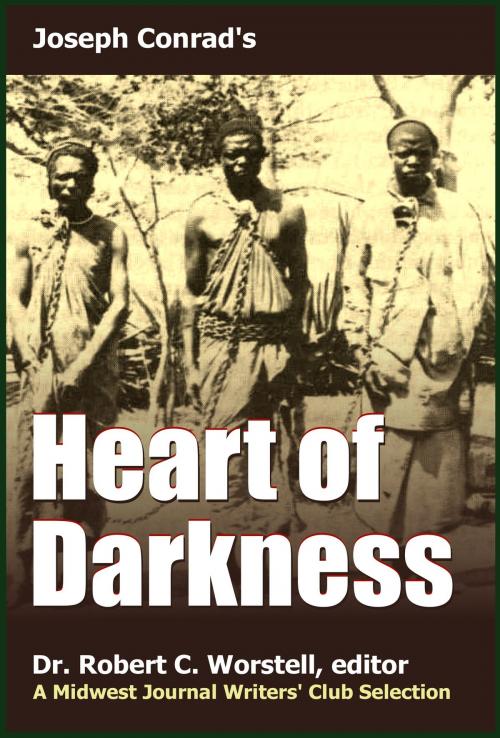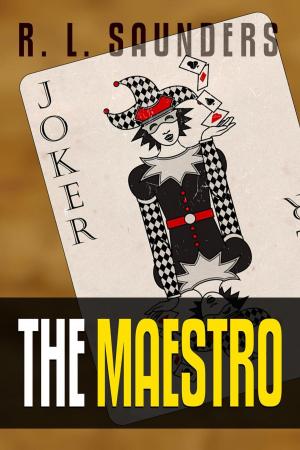Joseph Conrad's Heart of Darkness
A Midwest Journal Writers Club Selection
Nonfiction, History, Africa, Biography & Memoir, Historical, Fiction & Literature| Author: | Midwest Journal Writers' Club, Dr. Robert C. Worstell, Joseph Conrad | ISBN: | 9781304232236 |
| Publisher: | Midwest Journal Press | Publication: | July 15, 2013 |
| Imprint: | Language: | English |
| Author: | Midwest Journal Writers' Club, Dr. Robert C. Worstell, Joseph Conrad |
| ISBN: | 9781304232236 |
| Publisher: | Midwest Journal Press |
| Publication: | July 15, 2013 |
| Imprint: | |
| Language: | English |
About this book:
Heart of Darkness (1899), by Joseph Conrad, is a short novel about Charles Marlow’s job as an ivory transporter down the Congo River in Central Africa. This river is described to be “... a mighty big river, that you could see on the map, resembling an immense snake uncoiled, with its head in the sea, its body at rest curving afar over a vast country, and its tail lost in the depths of the land.” In the course of his commercial-agent work in Africa, the seaman Marlow becomes obsessed by Mr. Kurtz, an ivory-procurement agent, a man of established notoriety among the natives and the European colonials.
Aboard the Nellie, anchored in the River Thames near Gravesend, England, Charles Marlow tells his fellow sailors about the events that led to his appointment as captain of a river-steamboat for an ivory trading company. He describes his passage on ships to the wilderness to the Company's station, which strikes Marlow as a scene of devastation: disorganized, machinery parts here and there, periodic demolition explosions, weakened native black men who have been demoralized, in chains, literally being worked to death, and strolling behind them a white Company man in a uniform carrying a rifle.
Marlow leaves with a caravan to travel on foot some two hundred miles deeper into the wilderness to the Central Station, where the steamboat that he is to captain is based. Marlow is shocked to learn that his steamboat had been wrecked two days before his arrival. The manager explains that they needed to take the steamboat up-river because of rumours that an important station was in jeopardy and that its chief, Mr. Kurtz, was ill. Marlow describes the Company men at this station as lazy back-biting "pilgrims", fraught with envy and jealousy, all trying to gain a higher status within the Company, which in turn, would provide more personal profit; however, they sought these goals in a meaningless, ineffective and lazy manner, mixed with a sense that they were all merely waiting, while trying to stay out of harm's way. After fishing his boat out of the river, Marlow is frustrated by the months spent on repairs.
Once underway, the journey up-river to the Inner Station, Kurtz's station, takes two months to the day. On board are the manager, three or four "pilgrims" and some twenty "cannibals" enlisted as crew.
They come to rest for the night about eight miles below the Inner Station. In the morning they awake to find that they are enveloped by a thick, white fog. From the riverbank they hear a very loud cry, followed by a discordant clamour. A few hours later, as safe navigation becomes increasingly difficult, the steamboat is hit with a barrage of sticks—small arrows—from the wilderness. The pilgrims open fire into the bush with their Winchester rifles. The native serving as helmsman gives up steering to pick up a rifle and fire it. Marlow grabs the wheel to avoid snags in the river. The helmsman is impaled by a spear and falls at Marlow's feet...
(source: Wikipedia)
About this book:
Heart of Darkness (1899), by Joseph Conrad, is a short novel about Charles Marlow’s job as an ivory transporter down the Congo River in Central Africa. This river is described to be “... a mighty big river, that you could see on the map, resembling an immense snake uncoiled, with its head in the sea, its body at rest curving afar over a vast country, and its tail lost in the depths of the land.” In the course of his commercial-agent work in Africa, the seaman Marlow becomes obsessed by Mr. Kurtz, an ivory-procurement agent, a man of established notoriety among the natives and the European colonials.
Aboard the Nellie, anchored in the River Thames near Gravesend, England, Charles Marlow tells his fellow sailors about the events that led to his appointment as captain of a river-steamboat for an ivory trading company. He describes his passage on ships to the wilderness to the Company's station, which strikes Marlow as a scene of devastation: disorganized, machinery parts here and there, periodic demolition explosions, weakened native black men who have been demoralized, in chains, literally being worked to death, and strolling behind them a white Company man in a uniform carrying a rifle.
Marlow leaves with a caravan to travel on foot some two hundred miles deeper into the wilderness to the Central Station, where the steamboat that he is to captain is based. Marlow is shocked to learn that his steamboat had been wrecked two days before his arrival. The manager explains that they needed to take the steamboat up-river because of rumours that an important station was in jeopardy and that its chief, Mr. Kurtz, was ill. Marlow describes the Company men at this station as lazy back-biting "pilgrims", fraught with envy and jealousy, all trying to gain a higher status within the Company, which in turn, would provide more personal profit; however, they sought these goals in a meaningless, ineffective and lazy manner, mixed with a sense that they were all merely waiting, while trying to stay out of harm's way. After fishing his boat out of the river, Marlow is frustrated by the months spent on repairs.
Once underway, the journey up-river to the Inner Station, Kurtz's station, takes two months to the day. On board are the manager, three or four "pilgrims" and some twenty "cannibals" enlisted as crew.
They come to rest for the night about eight miles below the Inner Station. In the morning they awake to find that they are enveloped by a thick, white fog. From the riverbank they hear a very loud cry, followed by a discordant clamour. A few hours later, as safe navigation becomes increasingly difficult, the steamboat is hit with a barrage of sticks—small arrows—from the wilderness. The pilgrims open fire into the bush with their Winchester rifles. The native serving as helmsman gives up steering to pick up a rifle and fire it. Marlow grabs the wheel to avoid snags in the river. The helmsman is impaled by a spear and falls at Marlow's feet...
(source: Wikipedia)















